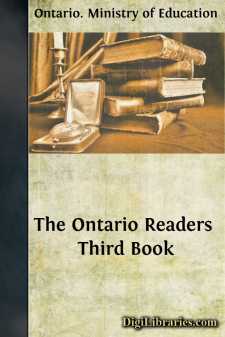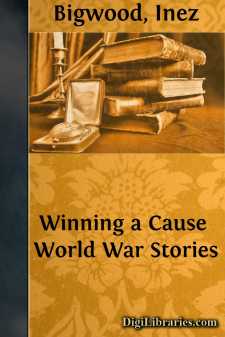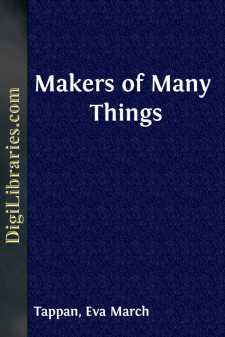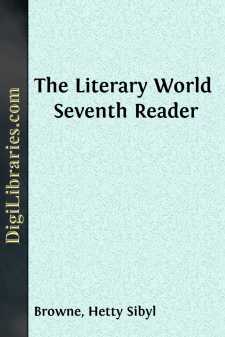Juvenile Nonfiction
- Animals 10
- Art 1
- Biography & Autobiography 2
- Boys & Men 1
- Business & Economics 3
- Cooking & Food 2
- Gardening 1
- General 32
- Girls & Women 7
- History 2
- Holidays & Celebrations 1
- Lifestyles 79
- Literary Criticism & Collections 5
- Nature 11
- Readers
- Religion 4
- Sports & Recreation 1
Readers Books
Sort by:
by:
Aletta E. Marty
Importance of Oral ReadingThere are several reasons why every boy or girl should strive to become a good reader. In the first place, good oral reading is an accomplishment in itself. It affords a great deal of pleasure to others as well as to ourselves. In the second place, it improves our everyday speech and is also a preparation for public speaking; for the one who reads with distinctness and an...
more...
by:
Michael Clarke
I. TROY BEFORE THE SIEGE. Design by Burne-Jones.That part of Asia Minor which borders the narrow channel now known as the Dar-da-nellesÐÐÐâ, was in ancient times called TroÐÐÐâas. Its capital was the city of Troy, which stood about three miles from the shore of the Æ-geÐÐÐâan Sea, at the foot of Mount Ida, near the junction of two rivers, the...
more...
FORTUNE AND THE BEGGAR One day a ragged beggar was creeping along from house to house. He carried an old wallet in his hand, and was asking at every door for a few cents to buy something to eat. As he was grumbling at his lot, he kept wondering why it was that folks who had so much money were never satisfied but were always wanting more. "Here," said he, "is the master of this house—I...
more...
LESSON XLVI NEW WORDS.sobathsickpleasetubwrapshawlsis'terNow, Ned, please do not put my kitty into the bath tub. Yes, sister, I must give her a bath. Here is the bath tub with some nice warm water. But, Ned, kitty will get sick if you put her into the water. She will take cold. No, I will wrap her well in the big shawl, and then she can not take cold. So Ned gave kitty a bath, and then put her...
more...
LITTLE RED RIDING-HOOD PERSONS IN THE PLAY—Little Red Riding-Hood, Mother, Bird, Wolf, Miller, Grandmother Scene I.—At Red Riding-Hood's Home Mother. Would you like to go to grandmother's to-day, my child? The sun is bright and the air is warm and pleasant. Little Red Riding-Hood. Yes, mother, you know I always like to visit dear grandmamma. Mother. Then you may go. You may carry your...
more...
by:
Inez Bigwood
PREFACE Lest We Forget, the first volume of World War stories, gave an outline of the struggle up to the time of the signing of the armistice, November 11, 1918, and contained in general chronological order most of the stories that to children from ten to sixteen years of age would be of greatest interest, and give the clearest understanding of the titanic contest. This; the second volume of the same...
more...
In this Fifth Reader of the De La Salle Series the plan of the preceding numbers has been continued. The pupil has now mastered the mechanical difficulties of learning to read, and has acquired a fairly good working vocabulary. Hence he is prepared to read intelligently and with some degree of fluency and pleasure. Now is the time to lead him to acquire a taste for good reading. The selections have...
more...
by:
Anonymous
GO-ING TO CHURCH. How neat and nice this lit-tle boy and his sis-ter look, go-ing in their Sun-day clothes to church! The lit-tle girl has, I dare say, her prayer book in her bag, and her bro-ther has his un-der his arm. They seem by their fa-ces, to be good chil-dren, and ap-pear ve-ry fond of each oth-er. They have been taught by their kind pa-rents, that it is their du-ty to at-tend di-vine...
more...
by:
Eva March Tappan
I THE LITTLE FRICTION MATCH I remember being once upon a time ten miles from a store and one mile from a neighbor; the fire had gone out in the night, and the last match failed to blaze. We had no flint and steel. We were neither Indians nor Boy Scouts, and we did not know how to make a fire by twirling a stick. There was nothing to do but to trudge off through the snow to the neighbor a mile away and...
more...
RIP VAN WINKLE I Whoever has made a voyage up the Hudson must remember the Catskill Mountains. They are a branch of the great Appalachian family, and are seen away to the west of the river, swelling up to a noble height, and lording it over the surrounding country. Every change of season, every change of weather, indeed, every hour of the day, produces some change in the magical hues and shapes of...
more...











